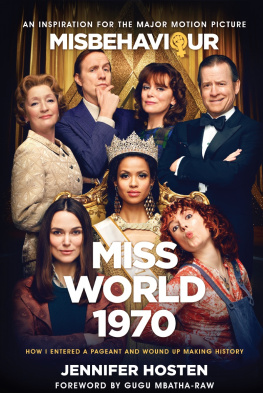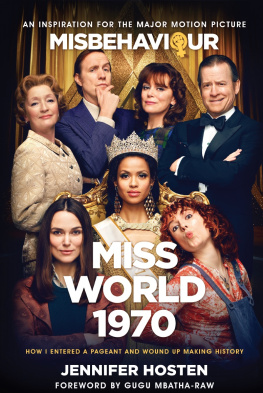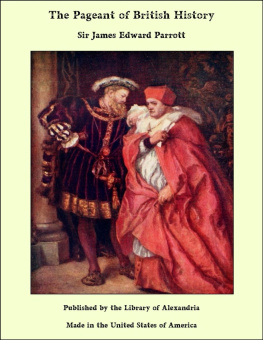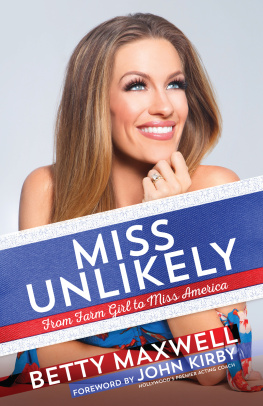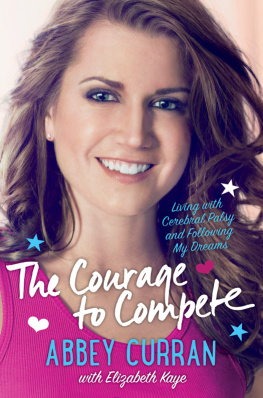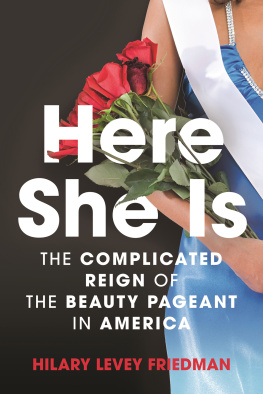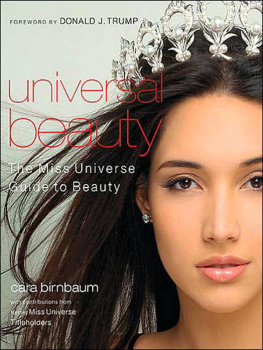

Sutherland House
416 Moore Ave., Suite 205
Toronto, ON M4G 1C9
Copyright 2020 by Jennifer Hosten
All rights reserved, including the right to reproduce this book or
portions thereof in any form whatsoever. For information on rights and
permissions or to request a special discount for bulk purchases, please
contact Sutherland House at
Sutherland House and logo are registered
trademarks of The Sutherland House Inc.
First edition, February 2020
If you are interested in inviting one of our authors to a live event or
media appearance, please contact
and visit our website at sutherlandhousebooks.com for more
information about our authors and their schedules.
Manufactured in the United States
Cover designed by Lena Yang
Book composed by Karl Hunt
Cover photo courtesy of Getty Images
Library and Archives Canada Cataloguing in Publication
Title: Miss World 1970 : How I entered a pageant and
wound up making history / Jennifer Hosten ;
Names: Hosten-Craig, Jennifer, author.
Identifiers: Canadiana 20200154230 | ISBN 9781989555231 (hardcover)
Subjects: LCSH: Hosten-Craig, Jennifer. | LCSH: Beauty contestants
GrenadaBiography. | LCSH: Beauty contestsHistory20th century. |
LCSH: Miss World Pageant. | LCSH: DiplomatsGrenadaBiography.
Classification: LCC HQ1220.G84 H67 2020 |
DDC 791.6/6092dc23
ISBN 978-1-9895552-3-1
FOREWORD
I FIRST MET JENNIFER HOSTEN for breakfast in Grenada. I somehow knew it was her from her poised posture and the calm, regal energy she exuded as I approached the open-air restaurant overlooking the islands famously endless Grand Anse beach.
I have to admit, I was a little nervous to meet finally this Miss World pioneer, who in 1970 was the first woman of colour to win the title in one of the most intersectional and controversial contests in the competitions history, hijacked by the newly formed womens liberation movement on live television and watched by millions. The contest arguably became a springboard for 1970s feminism.
I was about to play Jennifer in a major movie based on those events. I was researching the role at the height of 2018s #MeToo and Times Up movements, having been on my first womens march one year earlier. With conversations about representation, gender, misogyny and abuse of power reverberating in the zeitgeist from Hollywood to every industry, corporation, and beyond, it felt like the perfect time to learn from someone who inadvertently became the poster child for these issues in a very different era.
I had so much to ask her but I also wanted to observe her essence and breathe her in, in the context of the island of which she was and, as I would discover, will always be queen.
Wed spoken briefly on the phone and exchanged a couple of emails in which Id boldly suggested meeting in Grenada to fulfil my romantic research fantasy. To my disappointment, the whole film was to be shot in the United Kingdomthe pageant had taken place in Londonso no exotic James Bond-style shoots on this Caribbean spice island, no flashbacks to Jennifer winning Miss Grenada on the beach, just London in December and my imagination, which I was determined to fuel on this trip!
I was delighted that Jennifer agreed to join me in Grenada, but in that moment, approaching our breakfast, butterflies arose within me. Jennifer, now based in Canada, and myself, having travelled from London, had both taken a leap of faith in deciding to meet. Jennifer was accompanied by her daughter Sophia. I had brought my Mum along for a break from the British winter. Couldnt it all be terribly awkward? Couldnt it all go horribly wrong?
Once I drew closer, those unmistakable deep brown eyes locked me in. Bright and burning with intelligence and wisdom, they looked into my soul and stilled my apprehension.
Reading the script for our film, Misbehaviour, was my first introduction to the historic events of Miss World 1970. Growing up, as I did, in 1980s and 1990s Oxfordshire, Miss World was not something of which I was aware. Id never seen it on TV and certainly had no contact with the world of pageants in my childhood or teens. I was never considered a beauty and although I loved dance and drama, it was never competitive. I suppose, as someone brought up and praised for what was inside my mind as opposed to how I looked, I, like many of my generation and culture, viewed beauty pageants with a mild disdain, dismissing them as an arena of the vacuous and superficial.
Talking with Jennifer, wise and well-travelled and now a trained psychotherapist, opened my mind. The thing that struck me most was that, at the time, she saw the competition as an opportunity and a stepping stone to a bigger life. What I learned to appreciate is that in that period Grenada still did not have its independence from Britain and 1970, the first year that Grenada had entered the competition, was a chance to put her small island on the map.
Jennifer took her role seriously as an ambassador for her country. The potential for the contest to open doors for her in the realm of broadcasting was a strong motivation and without taking it too seriously, she saw it as a means to an end and an enriching experience.
As her sister Pommie always said, winning a pageant requires a package deal. Jennifer knew that physical beauty was just one facet of what made someone attractive, and that intelligence, grace and personality would also need to be paramount if she were to gain an edge.
Watching the recording of the actual pageant was still a strangely uncomfortable experience for me. The misogynistic tone and language used by Bob Hope and the tight smiles of the contestants as they were objectified beyond beliefasked to turn their behinds to the crowd for better inspectionmade me sputter in offense. Jennifers daughter Sophia shared my outrage. It was a moment that Philippa Lowthorpe, the director of Misbehaviour, was keen to highlight, but at least in our film the moment is firmly rooted in the female gaze.
I also appreciated the nuances of Miss South Africa and Miss Africa South in the script, with South Africa shamed into submitting a black contestant for the first time, at the last minute, alongside its white contestant. It sounds absurd today for one nation to submit two women of different complexions, but with the anti-Apartheid campaign at its height, beauty had become politicised to powerful effect.
I was keen to capture Jennifers pragmatic and centred intelligence in my portrayal of her, and over the four special days that we spent together in Grenada, I had time to discover more details that would help me honour her spirit in the role. I ran barefoot in the sand the length of Grand Anse beach as she had done to get in shape for the contest. We explored the town of St. Georges where as a girl shed seen Joan Collins and Harry Belafonte film Island In the Sun. We walked the street where she grew up and visited the house where she spent her summer holidays. All the while, I listened to the music of her unique accent. Jennifer was kind enough to record her mothers poem, Ode To Grenada, into my iPhone with the waves lapping in the background and I listened to it in my trailer most days on set.
Jennifer even offered to lend me for the film the original gold evening gown that she wore in the competition. Perfectly preserved, the striking gold crochet gown arrived in a shoebox shortly after our Grenada trip. Although the scene in which I wear it in the film is brief, it was very special and evocative for me to be able to wear the original dress for that moment and also for the photoshoot for the
Next page
